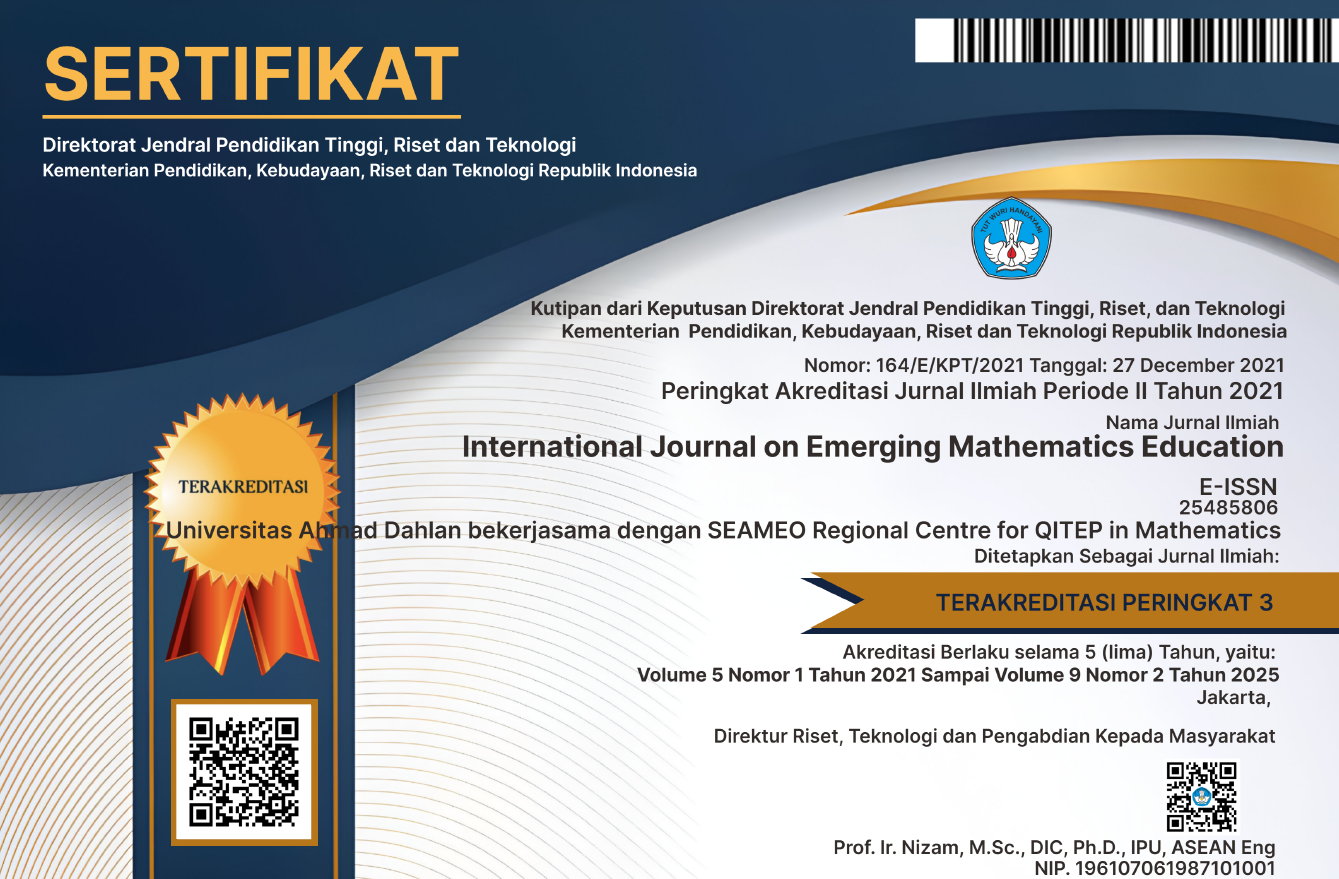Developing an Interactive E-Book on Statistics Based on a Realistic Mathematical Approach Assisted by The SIPDA Learning Management System
DOI:
https://doi.org/10.12928/ijeme.v6i2.21027Abstract
The government policy in March 2020 regarding the application of online learning has significant changes in the learning process on campus. One of them is by changing teaching materials from textbooks to e-books, which is a must as a form of adjustment related to campus conditions that implement full online learning using LMS SIPDA. The objectives of this study are: (1) Producing an interactive e-book on basics statistics based on Realistic Mathematics assisted by the SIPDA LMS developed by using a valid and practical Kvisoft Flipbook Maker (2) To determine the effectiveness of the e-book Basics of Statistics in improving student problem-solving abilities. This type of research is Research and Development with the ADDIE development model, namely analysis, design, development, implementation, and evaluation. E-book development using the Kvisoft Flipbook Maker Application. The results of the e-book development at the needs analysis stage showed that 85% of students needed integrated learning media. SIPDA integrated e-books can increase student attendance and activities by 60%. At the product design stage, the e-book in the form of a word file is converted into a PDF file and then developed using Kvisoft Flipbook Maker by adding videos, images, and other files. The e-book is validated with a validity rate of 92% by material experts and 89% by media experts. The value of practicality is seen from two things, namely: (1) Questionnaire for responses from media experts and two practitioner lecturers, it was found that the e-book developed could be applied in the good category (3.92) and met the practical criteria (80%) used in the online learning era. (2) The student response questionnaire in a small group of 10 people obtained the category Good (3.96) and very practical (85%). The percentage of student response questionnaire results at the implementation stage of the SIPDA class showed a positive response of 87.6%. The effectiveness aspect is seen from the average individual learning completeness of 71.42 with classical completeness criteria obtained by 91. And the N-Gain score was 0.71 in high category.References
Ahmad, M., & Asmaidah, S. (2017). Pengembangan perangkat pembelajaran matematika realistik untuk membelajarkan kemampuan pemecahan masalah matematika siswa SMP. Mosharafa: Jurnal Pendidikan Matematika, 6(3), 373-384.
Akbar, A. B., & Prayoga, Y. C. (2021). Efektifitas Pembelajaran Online: Kepercayaan Diri, Kepuasan Pembelajaran Online Terhadap Performa Pembelajaran untuk Meningkatkan Kualitas Pendidikan. Jurnal Pendidikan dan Konseling (JPDK), 3(1), 117-121.
Buchori, A. (2019). Pengembangan multimedia interaktif dengan pendekatan kontekstual untuk meningkatkan pemecahan masalah kemampuan matematika. Jurnal Inovasi Teknologi Pendidikan, 6(1), 104-115.
Firman, F., & Rahayu, S. (2020). Pembelajaran online di tengah pandemi covid-19. Indonesian Journal of Educational Science (IJES), 2(2), 81-89.
Marom, S. (2018). Pengembangan Desain Pembelajaran Matematika Realistik Melalui Lesson Study Berbantuan Wolframs Mathematica. Matematika Dan Pembelajaran, 6(1), 23-29.
Mustofa, M. I., Chodzirin, M., Sayekti, L., & Fauzan, R. (2019). Formulasi model perkuliahan daring sebagai upaya menekan disparitas kualitas perguruan tinggi. Walisongo Journal of Information Technology, 1(2), 151-160.
NCTM. (2000). Principles and Standards for School Mathematics. Reston: NCTM.
Octamela, K. S., Suweken, G., & Ardana, I. M. (2019). Pemahaman Matematis Siswa Dengan Menggunakan Buku Elektronik Interaktif Berbantuan Geogebra. JNPM (Jurnal Nasional Pendidikan Matematika), 3(2), 305-315
Rahayu, R., & Hernadi, J. (2020). Pengembangan Perangkat Pembelajaran Matematika Dengan Pendekatan Pmri Untuk Pembelajaran Online. EDU-MAT: Jurnal Pendidikan Matematika, 8(2).
Safitri, I. (2015). Pengembangan E-Module Dengan Pendekatan Pembelajaran Matematika Realistik Berbantuan Flipbook Maker Pada Materi Bangun Ruang Sisi Datar Kelas Viii Smp. AKSIOMA: Jurnal Matematika dan Pendidikan Matematika, 6(2), 1-10.
Sembiring, R.K., et al. (2010): A Decade od PMRI in Indonesia. Utrecht: APS
Zulkardi & Putri, R.I.I. (2010). Pengembangan Blog Support untuk Membantu Siswa dan Guru Matematika Indonesia Belajar Pendidikan Matematika Realistik Indonesia (PMRI). Jurnal Inovasi Perekayasa Pendidikan (JIPP), 2 (1), 1-24.
Downloads
Published
How to Cite
Issue
Section
License
License and Copyright Agreement
In submitting the manuscript to the journal, the authors certify that:
- They are authorized by their co-authors to enter into these arrangements.
- The work described has not been formally published before, except in the form of an abstract or as part of a published lecture, review, thesis, or overlay journal. Please also carefully read the International Journal on Emerging Mathematics Education (IJEME) Author Guidelines at http://journal.uad.ac.id/index.php/IJEME/about/submissions#authorGuidelines
- That it is not under consideration for publication elsewhere,
- That its publication has been approved by all the author(s) and by the responsible authorities, tacitly or explicitly, of the institutes where the work has been carried out.
- They secure the right to reproduce any material that has already been published or copyrighted elsewhere.
- They agree to the following license and copyright agreement.
Copyright
Authors who publish with the International Journal on Emerging Mathematics Education (IJEME) agree to the following terms:
- Authors retain copyright and grant the journal the right of first publication with the work simultaneously licensed under a Creative Commons Attribution License (CC BY-SA 4.0) that allows others to share the work with an acknowledgment of the work's authorship and initial publication in this journal.
- Authors are able to enter into separate, additional contractual arrangements for the non-exclusive distribution of the journal's published version of the work (e.g., post it to an institutional repository or publish it in a book), with an acknowledgment of its initial publication in this journal.
- Authors are permitted and encouraged to post their work online (e.g., in institutional repositories or on their website) prior to and during the submission process, as it can lead to productive exchanges, as well as earlier and greater citation of published work.
![]()
Ciptaan disebarluaskan di bawah Lisensi Creative Commons Atribusi-BerbagiSerupa 4.0 Internasional.




